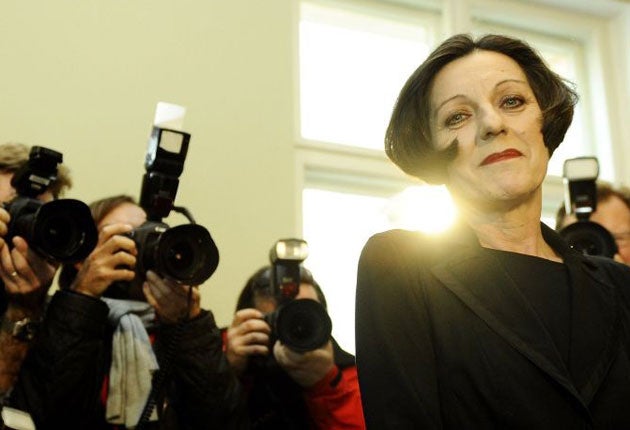German writer wins Nobel literature prize
Publishing houses from around the world are scrabbling to translate work of Nobel winner, Herta Müller

Herta Müller may have been a little-known Romanian-born German novelist and poet just 48 hours ago but publishing houses from around the world were yesterday scrabbling to translate her work after she claimed the Nobel Prize for Literature.
Only four of Müller's 15 works of fiction have so far been translated into English but by all indication that is about to change.
Müller, 56, whose works focus on describing life under Nicolae Ceausescu's totalitarian regime, expressed her surprise at receiving the honour, saying: "I still can't quite believe it."
She is now set to be a global phenomenon once the "Nobel effect" takes place. A spokeswoman from her German publisher, Karl Hauser, said they had been fielding phone calls all day, who were expressing interest in obtaining her books in translation.
"Our foreign rights department has been on the phone all day. There is interest from publishing houses from across the world," she said.
Pete Ayrton, at Serpent's Tail, the first English publisher to translate Müller's work, The Passport, in 1989, said up to only 20,000 copies of the book had been sold in 20 years, although he expected that number to rise substantially after the book was reissued on 19 October. He said he had seen a similar effect take place after Elfriede Jelinek, author of The Piano Teacher (adapted for film by Michael Haneke), won the prize in 2004.
"We obviously expect to sell large quantities of The Passport in the UK. I suspect every publisher is going to get into some fierce bidding (for more translations). It means a lot to be a Nobel prize winner and it is the job of the Nobel prize (committee) to bring to wider public attention writers that are neglected," he said.
Mr Ayrton added that he had been struck by the beauty of the book, which is about a woman who, during Ceausescu's regime, works in a clothes factory and sews notes into the suits of men bound for Italy that read "marry me". He said: "There is a wonderful evocation of a totalitarian regime based on everyday reality but it has a surreal edge, rather than social realism. That is part of its greatness."
Müller is the 12th woman to receive the Nobel prize since it was established in 1901. Born in 1953 in Romania, she refused to co-operate with Ceausescu's Securitate and lost her job as a result. She was the subject of threats until she emigrated to Berlin in 1987, where she still lives. She has already received Germany's most prestigious prize, the Kleist award, as well as the Franz Kafka prize and the Impac award. She has continued to write novels and poetry with themes of oppression, exile and dictatorship. The Swedish academy commended both her poetry and prose and said she "depicts the landscape of the dispossessed".
Fiona Sampson, editor of Poetry Review, said she had written some of her novels, courageously, under Ceausescu, rather than in the safety of Germany: "Very few writers in the world today are able to write like her in terms of the quality of her work, as well as her ability to bear witness. She is an extraordinary brave dissident who is also an extraordinary writer."
Margaret Halton, who bought the novel The Land of Green Plums for Granta in 1998, said: "I'm delighted she's won the prize. It will change her life."
Two other novels – The Appointment and Children of Ceausescu, have been translated by American publishers. Her current novel, Atemschaukel, set in Romania during the Second World War, has sold 40,000 copies in Germany since its publication this August.
Her victory defies predictions, from bookmakers at least, who had put the Israeli writer Amos Oz as odds-on favourite to win, followed by Joyce Carol Oates and Philip Roth.
Translated: Work by Herta Müller
From The Passport:
Amalie hangs the map of Romania on the wall. "All children live in blocks of flats or in houses," says Amalie. "Every house has rooms. All the houses together make one big house. This big house is our country. Our Fatherland." Amalie points at the map. "This is our Fatherland," she says. With her fingertip she searches for the black dots. "These are the towns of our Fatherland. The towns are the rooms of this big house, our country. Our fathers and mothers live in our houses. They are our parents. Every child has its parents. Just as the father in the house we live is our father, so Comrade Nicolae Ceaucescu is the father of our country."
From The Land of the Green Plums:
The gym instructor was the first to raise his hand. All the other hands flew up after his. While raising their hands, everybody looked at the raised hands of the others. If someone's own hand wasn't as high as the others, he would stretch his arm a little farther. People kept their hands up until their fingers grew tired and started to droop. Everyone looked around, and since no one else's arm was lowered, they straightened their fingers again and extended their elbows. Sweat stains showed under the arms. Necks were stretched, ears turned red, lips parted and stayed half-open. Heads kept still, while eyes slid from side to side.
Join our commenting forum
Join thought-provoking conversations, follow other Independent readers and see their replies
Comments
Bookmark popover
Removed from bookmarks